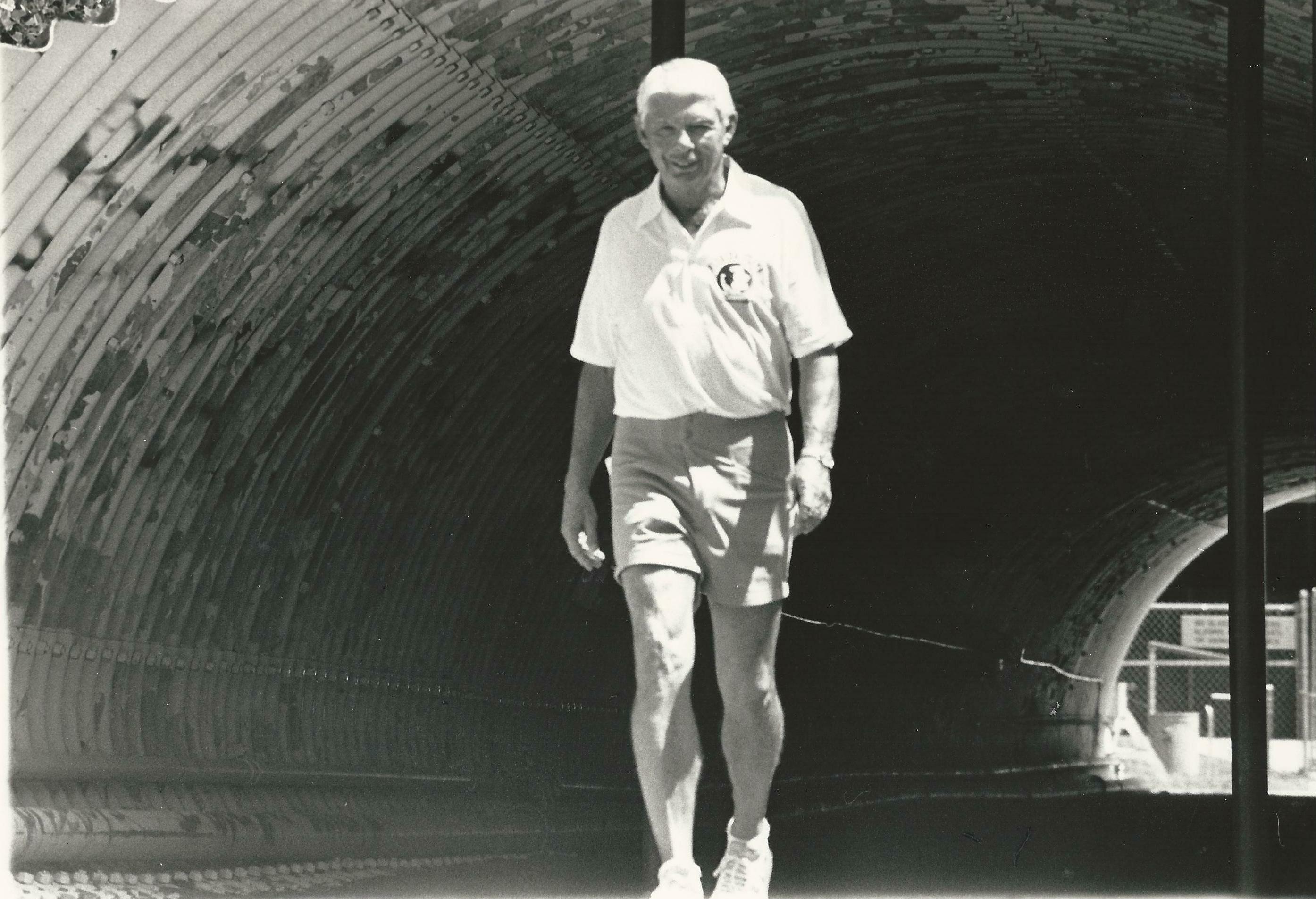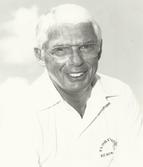
| Don Fauls |
Full Name: Donald James Fauls
Born: April 29, 1920, Ithaca, N.Y.
Died: November 9, 1995, Raleigh, N.C.
Legacy Bricks: Legacy Walk Map Link
1986 Adminsitrator HOF - Loc 50
|
| Click On Photo To Enlarge |
 |
| FSU Career |
| Coaches & Administrators | |
A
|
 |
| Member of the FSU Hall of Fame |
| Elected into the FSU Hall of Fame in 1986 |
|
In 1954, Don Fauls left his job as trainer in the St. Louis Cardinals organization to become head trainer at Florida State University. With only a two year break, the man called "Doc," and "Rooster,"
was Seminole trainer until 1986. He became a national leader in his field and is a member of the National Athletic Trainer's Hall of Fame. Four decades of Seminole athletes have been taped by him,
advised by him and had their aches and pains treated by him. He has been a wise friend to players and coaches alike. Don Fauls has also been a community resource with his professional expertise
available to the entire community. "Doc's" resume says he is 5'7" tall and weighs 145 pounds. To four decades of Seminoles he has been a giant. More than any person, Don Fauls has been the central
force in Florida State athletics. From the Tallahassee Democrat, November 11, 1995, page 1, By Gerald Ensley, Democrat Staff Writer. Seminole legend Doc Fauls dies in North Carolina at
75. Doc departed quiety. Legendary former Florida State University athletics trainer Don Fauls - known as "Doc" to 40 years of athletes, coaches and fans - died in his sleep Thursday night in Raleigh, N.C. Fauls was head FSU trainer from 1954 until his retirement in 1986, with a brief hiatus in the early 1970s to serve as general manager of a Tallahassee golf club. On Oct. 6, FSU dedicated the Don Fauls Training Room in his honor. Fauls, 75, was in Raleigh to attend today's game between FSU and North Carolina in Chapel Hill. News of his death met the team's arrival in Raleigh. "I have never met anyone who met Don who did not love and respect him," said head football coach Bobby Bowden. "FSU has lost a great ambassador and we have all lost a very good friend." Fauls died five months after his wife of 46 years, Marguerite, died of pancreatic cancer. Two days after her funeral, Fauls suffered a heart attack. Fauls also had suffered a heart attack in 1964, and was diagnosed with congestive heart failure three years ago. Yet he had rebounded in recent weeks, as he participated in research project testing as experimental new drug for congestive heart failure. "I'm feeling like my old self again," he told a reporter who visited his home a week ago. Fauls died in the home of former FSU football player Joe McGee, who was hosting a gathering of former Seminole players. Fauls, his daughter, Jackie, and 10 of those former players had gone out Thursday evening and planned to play golf Friday. Fauls went to bed at 11:30 p.m., but could not be roused when his daughter tried to awaken him shortly before 10 a.m. Friday. "if you had to plan a way to go, this was probably it," said Jackie Fauls. "He was with friends. He was laughing and enjoying himself. "Then, during the night, I guess he decided to join my mother." Funeral plans are pending. Fauls is survived by three children, two granddaughters and four sisters. Athletes became his lifelong friends. Fauls' death sent shock waves throughout the FSU community. Most affected were hundreds of former FSU athletes. To them, Fauls was a confidant and advisor whom they could trust with their direst troubles. Dozens of FSU athletes became lifelong friends, including celebrities such as Burt Reynolds, Dick Howser and Lee Corso. "He was like a father figure to me when I was at FSU," said Corso, an ESPN broadcaster who played for FSU from 1953-56. "Then he became a brother. Then he became like a member of my family. "I think that's the way all of us who played at FSU felt about Don." Fauls' influence was widespread. Over the years, he treated the aches and ills of hundreds of Tallahassee youths and adults free of charge. He rendered those services because he thought it was important to FSU's public relations. "He was an institution, and he was so vital to the program," said Vaughn Mancha, the FSU athletics director from 1959-71. "He was not only a great trainer but a very unique person." Also nicknamed Rooster, for his size (5-foot-7, 145 pounds) and outspoken attitude, Fauls could be stubborn and sharp-tongued. He clashed with boosters whom he thought interfered with the FSU program. He could be cold to reporters he thought were unduly critical of the program. He was short with those who questioned his medical judgment, once threatening to quit when a football assistant coach upbraided him for not getting injured players back on the field fast enough. Yet he also could cast a critical eye at players he thought were not tough enough to play with minor injuries, charging them with "dropsy and heart trouble." "They drop to their butts and haven't got the heart to get up," was his famous line. But his candor generally had the backing of all five football, three basketball and six baseball head coaches he served. "I probably had the best job in the world, because I didn't have to listen to the B.S. of assistant coaches and critics," Fauls said in an interview in September. "It was like Bowden once told a reporter who asked him about a player I said wouldn't be playing that week. He said: 'That little, gray-haired guy makes the decisions.'" He wanted to be major-league trainer. It was perhaps a surprise that Fauls stayed at FSU long enough to become gray-haired. A star second baseman at Ithaca College in Ithaca, N.Y. - "I could run and I could field, but I wasn't major-league caliber" - Fauls set out to be a major-league baseball trainer. He had worked his way up to trainer of the St. Louis Cardinals' Class AAA team in Omaha, Neb., when a former Ithaca teammate, FSU assistant football coach Frank Twomey, recommended him to Seminole head coach Tom Nugent for the trainer's job at FSU in January 1954. By then, he and his wife - whom he called Marg - had three children: Donna, now 44, and twins Danny and Jackie, 43. So charmed by Florida weather and the opportunity for year-round work, Fauls accepted the job. By the time the Cardinals and Pittsburgh Pirates tendered feelers for a major-league position in the late 1950a, the Faulses were ensconced in Tallahassee. "Marg and I felt like this was home," he said. Fauls was named to the National Athletic Trainers Hall of Fame and the Ithaca College Hall of Fame. He worked as a trainer for the U.S. Pan American team and was a member of the Olympic Trainer's Selection Committee. After his 1964 heart attack, Fauls became an exercise buff, doing 30 minutes of stretching every morning and running three miles every afternoon - usually round and round the FSU practice field. He kept up that regimen until his most recent heart attack, abetting it with a passion for golf that carried him to a 5-handicap. Yet he struggled mightily after the
death of his wife, whom he had met and married when they both worked at a Veterans Administration hospital in Bath, N.Y. |
| FSU Statistics |